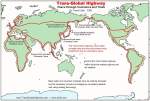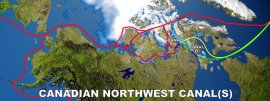But as a revealing podcast interview by Postmedia’s Brian Lilley with former Trump adviser Steve Bannon suggests, the president’s “obsession” with Canada is based on a geostrategic imperative to keep America safe from attack. Inciting an insurgency on the northern border would not appear to accord with the idea of defending Americans from evil foreigners.
He said Trump’s references to Panama, Greenland and Canada are not coincidental: they are part of a grand naval strategy to contain the Russian and Chinese navies.
America would “take back” the Panama Canal to ensure the Chinese and Russian navies could never hook up in the Caribbean, he said.
Control of Greenland would allow the U.S. to close the sea lanes against fast-attack and ballistic missile carrying Russian submarines coming out of Murmansk and Archangel, he said.
The aim is to “hermetically seal” the U.S. from attack.
He said Canada’s role is in the Arctic, where a new Great Game is playing out between the Americans, Chinese and Russians (the original Great Game was in the 19th century between Britain and Russia for control of the routes to India).
Bannon said Canada’s Arctic border is the “new soft underbelly” of the continent and is America’s greatest vulnerability.
The territorial integrity and sovereignty of Canada is going to be tested, and potentially lost, in the North, he said.
“The last couple of decades (for Canada) has been so much small ball. Now huge questions about the future of the country and the 21st century are before you,” he said. “Trump is not trolling people on this. This is serious…People should take it as a papal bull because there’s an opportunity cost. (Trump) could be talking about other things. I don’t know if he’s got a higher priority than hemispheric defence.”
The obvious question, which Lilley then asked, is: Does this mean the U.S. has to “absorb” Canada, as Trump has suggested? “The form of that has to be determined,” said Bannon.
COLD FRIGHT: Trump-Putin Arctic energy talks freeze out Canada and Denmark - Western Standard
Talks between US and Russian negotiators in Riyadh to end the war in Ukraine on Tuesday raised alarm for an altogether and potentially even more disturbing reason as far as Canada and Denmark are concerned.
That’s because POLITICO is reporting that Donald Trump and Vladimir Putin are open to energy deals north of the 60th parallel despite ongoing boundary disputes with Canada and Denmark, both of which the US strongman has expressed a strong — some say obnoxious — desire to annex.
The discussions, held in Saudi Arabia — of all places — signal “a possible shift in Arctic energy dynamics,” according to Denmark’s High North News with both countries now facing increased pressure to assert their sovereignty in the face of Russian and now US aggression.
Russian Direct Investment Fund (RDIF) chief Kirill Dmitriev confirmed the talks, stating that the two sides discussed broad economic cooperation, including specific Arctic projects. “It was more a general discussion, maybe joint projects in the Arctic. We specifically discussed the Arctic,” Dmitriev told POLITICOfollowing the meeting.
What’s worse, both countries — and NATO allies — were left in the dark.
The meeting, which notably excluded Canadian and European nations, has sparked unease in Ottawa, where officials have long viewed Arctic sovereignty as a core national interest. The prospect of U.S.-Russia cooperation in the region could undermine Canada’s strategic position, particularly as both countries seek to expand their influence over Arctic resources.
Foreign Minister Melanie Joly’s office has not yet commented on the meeting, but sources suggest Canadian officials are monitoring developments closely. “Any discussions that exclude us, especially on energy and security, are cause for concern,” said one senior government official, speaking on background.
Canada has long asserted its sovereignty over the Northwest Passage, a key shipping route that is becoming increasingly navigable due to climate change.
However, both the United States and Russia have challenged Canada’s claims, with Washington refusing to recognize Canadian jurisdiction over the passage and Moscow rapidly expanding its military presence in the Arctic.
The Trump administration previously signalled aggressive Arctic ambitions, including a controversial push to acquire Greenland from Denmark and annex Canada as the ‘51st State’ —an effort widely criticized as “destabilizing.”
Meanwhile, Russia has significantly ramped up its Arctic military infrastructure, deploying new icebreakers, missile systems and military bases.
Ottawa has taken steps in recent years to reinforce its Arctic presence, investing in new icebreakers, expanding military training exercises, and working with Indigenous communities to strengthen its territorial claims. However, analysts warn that Canada risks being sidelined if it does not take a more assertive diplomatic and strategic approach.
Canada, as one of the Arctic’s principal stakeholders, must now navigate an increasingly complex geopolitical landscapes, one where its allies and adversaries alike appear willing to make deals that could reshape the future of the North.
For Canada, the prospect of a US-Russia deal on Arctic energy raises serious questions about regional security, economic interests and environmental protection. Notwithstanding that the US is presumably its closest ally.
“If Russia and the US are striking agreements in the Arctic without Canada at the table, that’s a red flag,” said retired Canadian Forces Major-General David Fraser. “Our sovereignty is at stake.”
Do you buy this as the rationale for the 51st state comments?
Last edited:
Upvote
16



